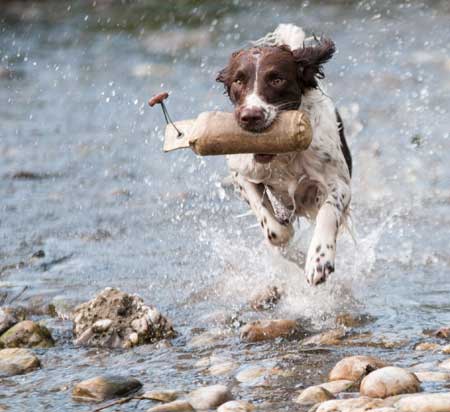Cranial Cruciate Ligament (CCL) ruptures are the most common cause of hind limb lameness in dogs. Dogs of any breed, sex or age can suffer a CCL injury. It’s a painful, acute or chronic degenerative injury, usually of the anterior cruciate ligament, that results in partial or complete instability of the knee joint.
Read more →Archive for the Clinic News Category
Alex, the clinic’s much loved resident Galah, has managed to get out of his cage and has taken off into the wide blue yonder. We’re all devastated of course, but we’re hopeful he will find his way back home. The last time he did this he was missing for five days but, with the help of the local community, was found safe and well, just very hungry.
Read more →We’re very proud to announce that Dr. Bek and Alpine Animal Hospital have been credited for our contribution to the discovery of a previously unidentified genetic disease in Tenterfield Terriers.
Following two years of intensive research and DNA testing, it has now been accepted by the veterinary community and breeder’s groups that Neonatal Hypothyroidism, or Congenital Hypothyroidism with Goiter (CHG) in Tenterfield Terriers is caused by a mutated gene, first identified by Dr. Bek right here in Porepunkah.
Read more →We’re excited to announce that we’ve been nominated for the Master Dog Breeders and Associates (MDBA) 5th Annual Dog Owner’s Choice Awards for 2012. We’ve been nominated in two categories. The hospital is up for the Best Vet Surgery/Clinic of the Year and Dr. Bek has also been nominated for Most Supportive Vet of the Year.
Read more →Alpine Animal Hospital will be closed for the statutory Public Holidays during the Christmas/New Year period. We understand that emergencies never take a break and accidents and illness can strike at any time. Dr. Bek will be on call for locals and visitors throughout the holiday period to provide advice and emergency care for your pets or farm animals. In an emergency please call (03) 5756 2444, day or night.
Read more →‘Tis the season … but it’s not always a jolly time for your pet. It’s the time of year we see lots of dogs, and a few cats, with problems caused by a grass seed getting lodged in some part of their anatomy. We might find them in the eyes or in the ear, up their nostrils or between their toes. They are always, at best, uncomfortable for your pet. At worst they are very painful and can cause serious long term damage.
Read more →We want to warn dog owners planning to travel away from the Alpine area, either out of state to coastal NSW or Queensland or to coastal Victoria, of the very high dangers of your dog (or your cat if he or she travels with you) picking up a potentially fatal paralysis tick while you are away.
With our cooler climate and higher altitude we rarely see paralysis ticks in the Alpine region (although they are found here), which probably tends to make local dog owners less likely to be aware of the risks. However, Dr. Bek has seen two cases of dogs suffering paralysis tick poisoning in just the last two weeks. In both cases the dogs had travelled with their family to the coast, where ticks are far more prevalent.
Welcome to our brand new website. If this is your first visit, Dr Bek hopes you’ll enjoy fossicking around and that you find what you’re looking for. If you have been to our previous site, we hope you will find this new site cleaner, more attractive and easier to find your way around. We also hope you’ll find a lot more information here than we could ever have on the old site, which was very limited.
Read more →Our animal hospital now has the ability to do in-house cultures on swabs to identify a specific bacteria and to establish its resistance and sensitivity to particular antibiotics, helping us identify the most effective antibiotic to use for treatment. Adding this new test to our already extensive pathology facilities is an important step forward in ensuring we can do all of our own testing right here in the Alpine region. The new bacterial swab culture facility has meant we can significantly reduce the waiting time between consult and test result, allowing us to quickly instigate the most appropriate and effective treatment.
Read more →We now have our own blood bank at the hospital, ensuring that, in cases of emergency, we can provide a blood transfusion to a dog injured in an accident, or needing blood because of a life-threatening illness. Do you know the blood group of your dog? Could you tell your vet what it was if your dog needed an emergency transfusion?
Read more →
